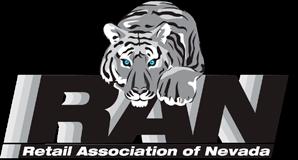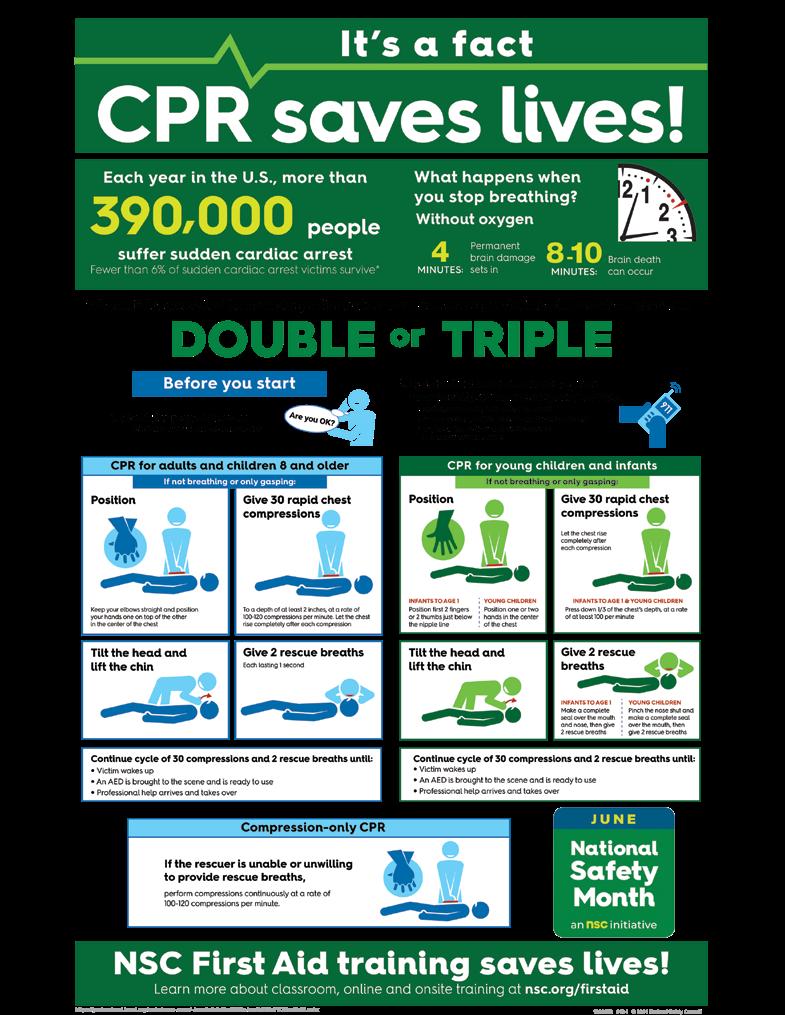




By Mary Lau
is more than a checklist. It’s a commitment that lives in the everyday decisions business owners make about how they run their operations and care for their people. For Nevada’s small businesses, this month offers a timely opportunity to reflect on one of the most foundational ways we uphold that commitment: ensuring access to reliable, affordable workers’ compensation insurance.
Small businesses—retail shops, restaurants, service providers, and independent operators—are the lifeblood of our economy and the heart of our communities. They represent the drive, ingenuity, and resilience that make Nevada’s local economies thrive. But despite their strength, too many small businesses face real challenges in securing the tools they need to protect their teams—workers’ comp chief among them.
For employers, workers’ compensation offers more

than a safety net—it provides peace of mind. Running a business is already filled with unknowns, and workers’ comp helps take one major worry off the table. It ensures that when accidents happen, employers aren’t left scrambling. Instead, they can respond with clarity, care, and confidence—backed by a system designed to support both the worker and the business.
Accessible workers’ comp reduces administrative headaches and legal risk, while streamlining the process of supporting injured employees. It enables faster recovery plans, smoother claims processes, and keeps employers focused
on growing their business, not navigating crises. For small businesses juggling countless responsibilities, that kind of operational ease is essential—not just for survival, but for success.
Better Protection
Builds Better Teams Team members notice when employers take their safety seriously. When people feel protected, they’re more engaged, more loyal, and more likely to stay. In small teams, that kind of stability matters. It strengthens workplace culture and builds trust that pays dividends far beyond the moment an injury might occur.
Nevada’s legislative leaders for their swift, bipartisan action in passing emergency legislation, Assembly Bill 171, which helped stabilize Nevada’s egg market and deliver meaningful relief to consumers—lowering prices by more than 30%, according to a new report from the Nevada Department of Agriculture.
“Governor Lombardo, Speaker Yeager, Majority Leader Cannizzaro, and Minority Leaders Titus and Hafen didn’t just act—they delivered for Nevadans,” said Bryan Wachter, Senior Vice President of the Retail
Association of Nevada.
“In a matter of weeks, we went from $10 eggs and empty shelves to stabilized prices and stocked stores. This is what bold, effective leadership looks like when government truly works for the people.”
Assembly Bill 171, signed into law on February 13, granted the State Quarantine Officer the authority to temporarily suspend Nevada’s cage-free egg mandate for up to 120 days in response to a USDA-declared animal disease emergency or federally declared disaster. At the height
of the disruption, egg prices exceeded $10 per dozen, and grocery stores imposed strict purchase limits. Within two months of enactment, prices dropped by more than 30%, offering significant relief to consumers.
“AB171 is a strategic
sectors,” Wachter added. “It ensures that when crises arise, our state leaders have the flexibility to act quickly and keep essential goods like eggs on store shelves.”

tool for Nevada’s agricultural and retail
Safety Isn’t Seasonal— But Awareness Helps
While safety is a yearround responsibility, National Safety Month calls us to take stock: Are we doing enough to protect our people? Are the systems in place strong, fair, and accessible? For many small
businesses, answering “yes” starts with having workers’ comp that’s not only available, but affordable. When coverage is within reach, businesses can lead with confidence, knowing they’re prepared for the unexpected.
Governor Joe Lombardo, Speaker Steve Yeager, Senate Majority Leader Nicole Cannizzaro, Senate Minority Leader Robin Titus, and Assembly Minority Leader Gregory Hafen worked together to unanimously pass AB171 in the early days of the legislative session, demonstrating a shared commitment to protecting con-sumers and stabilizing essential food supply chains.
Continued from page 1
At its best, workers’ compensation reflects a business owner’s values—an understanding that longterm success depends not just on profit, but on how we treat the people who help build it. Safety, trust,
and shared responsibility are the cornerstones of strong businesses and stronger communities. And in that sense, making workers’ comp accessible isn’t just good policy. It’s good business.
By Bryan Wachter
JUNE IS NATIONAL SAFETY MONTH—A TIME TO REVISIT HOW WE PROTECT workers. For the retail industry, that conversation is long overdue when it comes to one increasingly dangerous reality: organized retail crime (ORC).
Often dismissed as a loss prevention problem or conflated with petty theft, ORC is far more serious. It involves coordinated groups working systematically to defraud retailers through tactics like return fraud, employee distraction, and the covert removal of highvalue merchandise. But what makes ORC especially concerning in 2024 isn’t just the sophistication—it’s the rising threat to employee and consumer safety.
According to the National Retail Federation’s Impact of Retail Theft & Violence 2024 report, 73% of retailers say shoplifters have become more aggressive and violent, and 84% are increasingly concerned about the escalation of violence during theft incidents. The shift from covert to confrontational has real consequences: workers are left to manage unpredictable and dangerous situations without clear support

Bryan Wachter
or protection.
This is not about theft thresholds or isolated shoplifters. It’s about organized crime operating in publicfacing spaces— stores where Nevadans work, shop, and gather every day. The threat extends beyond employees. Stolen or fraudulent goods frequently reappear on unregulated online marketplaces, putting unsuspecting consumers at risk from expired, tampered, or unsafe products.
have prioritized ORC investigations, leading to the takedown of several high-level crime rings. Legislators have crafted policy solutions that treat ORC as distinct from everyday theft, emphasizing its organized and crossjurisdictional nature. These efforts have positioned Nevada as a national leader in ORC response.
But leadership must continue. Enforcement efforts need sustained funding and coordination. Retailers need clear, safety-
are placed in ambiguous, high-risk scenarios. One moment they’re providing customer service; the next, they’re navigating a coordinated scheme. Without proper training or support, these experiences leave workers vulnerable— physically and emotionally. The result is not only an unsafe workplace, but an unsustainable one.

Nevada has taken meaningful steps to address this challenge. Local law enforcement agencies
first policies that prioritize employee well-being over merchandise recovery. And the public needs to understand that ORC is not a victimless crime—it’s a threat to public safety, workplace stability, and consumer trust.
Too often, employees
National Safety Month should prompt more than a checklist. It should force a shift in mindset. ORC is not just a business operations issue. It is a workplace safety issue, a public safety issue, and a policy issue. Treating it as anything less only ensures its continued spread. This is organized crime happening in everyday spaces. It’s time we treat it with the urgency and seriousness it deserves—not just in our laws, but in our store policies, our employee protections, and our broader safety culture.
Nevada Rep. Dina Titus and Sen. Catherine Cortez Masto are backing companion bills in the House and Senate to fight the sharp rise in organized retail theft, which cost Nevada retailers an estimated $847 million in 2022. Titus’ Combating Organized Retail Crime Act, introduced alongside Rep. David Joyce of Ohio, would create a new coordination center within the Department of Homeland Security. This combines the expertise from law enforcement and the retail industry in the fight against organized retail crime. Cortez Masto is co-sponsoring the Senate version with Sen. Chuck Grassley of Iowa. As theft and related violence escalate across retail stores
Americans are expected to spend $34.1 billion on Mother’s Day this year, according to the National Retail Federation and Prosper Insights & Analytics, marking a slight increase from last year and approaching the 2023 record of $35.7 billion. With
and supply chains, the legislation aims to disrupt criminal networks while protecting local businesses and consumers.
The Center Square
Douglas County deputies arrested four individuals—Manuel Parra-Lopez, 24, Rosario Quinonez-Garcia, 44, Gerson Arango, 31, and Jenifer Lara-Vasquez, 27—who are suspected of being part of an organized retail theft ring after stopping a vehicle behind Carson Valley Plaza. Authorities say the group, believed to have targeted local businesses using walkie-talkies to coordinate, faced charges ranging from burglary and conspiracy to drug possession and possession of stolen goods. One suspect fled on foot
and remains at large, while two of the arrested have immigration holds. Sheriff Dan Coverley praised the swift cooperation among local and tribal law enforcement, including the use of drones and a K-9 to track suspects. All four detainees appeared in court Tuesday, with bail set as low as $150 cash in some cases.
The Record-Courier
Three suspects, including two brothers, are facing federal charges after allegedly stealing identities and using them to open fraudulent credit lines at high-end jewelry and retail stores, including some in Nevada. According to California Attorney General Rob Bonta, the group amassed over $300,000 in stolen goods across California, Arizona, Nevada,
and Utah by posing as others to max out store credit accounts. From March to July 2023, they allegedly stole the identities of 13 California residents and targeted well-known jewelry chains and Harbor Freight stores. Some merchandise was later sold at pawn shops for cash. The suspects face a total of 34 felony charges, including organized retail theft, grand theft, and identity theft.
Los Angeles Daily News
THEFT ARREST IN CARSON CITY Casey D. Overacker, 42, was arrested in Carson City on multiple charges, including felony organized retail theft and obtaining property under false pretenses, along with additional fraud and possession of stolen property offenses. Elko Daily
84% of adults planning to celebrate, average spending is projected at $259.04 per person. Popular gift categories include flowers, greeting cards, jewelry, and special outings, with experiential gifts gaining traction. Nearly half of shoppers prioritize finding unique or memory-making gifts. Online remains the most common shopping
method, followed by department and specialty stores.
The National Retail Federation reports retail sales climbed in April as consumers accelerated purchases to avoid anticipated price hikes tied to new tariffs, according
to the CNBC/NRF Retail Monitor. Excluding autos and gas, sales rose 0.72% month over month and 6.76% year over year, while core retail sales increased 0.9% monthly and 7.11% annually. Sectors seeing the strongest growth included digital products, electronics, groceries, and health and personal care. Despite
By Joe Hill, RAN Policy Analyst
DURING THE 2025 NEVADA LEGISLATIVE session, lawmakers took steps to improve workplace conditions in response to growing concerns about extreme heat and air quality. But while the intent to safeguard workers was clear and commendable, the realworld consequences of
these efforts revealed a more complex story— one where regulation, no matter how wellmeaning, can quickly become a burden when implementation outpaces practicality. Legislation like AB414 and SB260 addressed this growing concern—yet at times created solutions in search of problems, raising broader questions about the balance between
economic uncertainty, consumer spending remains resilient, supported by strong job numbers and stable household finances. Easter’s timing also contributed to stronger year-over-year comparisons.
The Retail Industry Leaders Association is applauding the introduction of the bipartisan Combating Organized Retail Crime Act of 2025 (CORCA), aimed at establishing a coordinated federal response to growing retail theft. The bill would create a Center at Homeland Security Investigations to unite federal, state, and local law enforcement with retail industry experts to target criminal rings behind
proactive policy and practical execution. Employers across Nevada, particularly in warehousing, retail, and outdoor industries like construction and agriculture, found themselves grappling with unclear guidance, costly compliance measures, and timelines that left little room for thoughtful execution. Small and mid-sized businesses were
Continued from previous page
large-scale theft, supply chain attacks, and scams. Supported by lawmakers from both parties, including Nevada’s Sen. Catherine Cortez Masto and Reps. Susie Lee and Dina Titus, CORCA seeks to disrupt networks tied to broader criminal activities such as drug trafficking and terrorism. Retailers are calling the legislation a necessary step to protect employees, consumers, and communities.
Despite ongoing economic pressures, U.S. grocery shoppers continue to prioritize health, convenience, and value, according to FMI – The Food Industry Association’s 2025
U.S. Grocery Shopper Trends report. Most consumers still enjoy food shopping and feel in control of their spending, though confidence has dipped from 85% in September 2024 to 75% today. Shoppers are adjusting by planning meals, using coupons, and managing household inventories. The report also highlights broad public backing for the Supplemental Nutrition Assistance Program (SNAP), with 70% of voters supporting it and opposing funding cuts. FMI calls the future of SNAP both an economic necessity and a moral imperative.
VIRGINIA LAWMAKERS FOR LANDMARK PBM REFORM
The National Association
especially vocal, raising concerns that the new rules could force them to cut back operations, scale down employment, or exit the state altogether. Many felt scared—not by the idea of improving worker safety—but by the lack of coordination, flexibility, and realistic pathways to compliance.
A common theme in the opposition wasn’t
Continued on page 11
of Chain Drug Stores (NACDS) is praising Virginia Governor Glenn Youngkin and state lawmakers for passing the Save Our Pharmacies Act (House Bill 2610), a major reform establishing a single, staterun pharmacy benefit manager (PBM) for Medicaid. The law brings transparency to drug pricing, combats excessive PBM markups, and aims to protect pharmacy access, especially in underserved areas. NACDS highlighted the urgency of the measure, citing federal data showing PBMs inflated prescription costs by thousands of dollars. Virginia joins a growing number of states taking bipartisan action to curb PBM practices and restore fairness in pharmacy care.
Nevada lawmakers are facing a projected $350 million budget shortfall for the upcoming two-year cycle, following new estimates from the state’s Economic Forum. The revised forecast reduces overall expected revenue by $191 million and slashes State Education Fund projections by nearly $160 million. Economists cite declining sales, payroll, and business tax revenues, largely attributed to Trump administration policies and tariff impacts, as key drivers. The shortfall threatens funding for hundreds of bills and may force significant cuts. While insurance and property tax projections rose slightly, uncertainty remains high as the state braces for reduced tourism, slower job growth, and possible federal funding cuts. Nevada Independent
The Clark County Commission unanimously approved permits for the Oakland Athletics’ planned stadium in Las Vegas, advancing the team’s relocation efforts. The $1.5 billion ballpark will be built on the former Tropicana Las Vegas site, with construction expected to begin in late 2025 and finish by 2028. Supporters at the meeting, including local union leaders and youth
sports advocates, praised the project’s economic potential and the team’s contributions to community sports. Sandy Dean, interim Athletics president, highlighted the stadium’s role in shaping the team’s future and expressed excitement for their upcoming move. 8 News Now
Republicans have added a controversial provision to their tax cut package that would authorize the sale of hundreds of thousands of acres of public lands in Nevada and Utah, sparking backlash from Democrats and environmentalists. The land, earmarked for uses including mining, infrastructure, and affordable housing, includes up to 200,000 acres in Clark County, Nevada, and parcels near Zion National Park. Critics call it a “land grab” tied to tax breaks, while supporters argue it will drive local development and federal revenue. The measure also includes lower royalty rates for fossil fuel extraction and expanded oil and gas leasing, deepening concerns over its environmental impact.
Associated Press
A record 31 University of Nevada, Reno (UNR) students are interning at
the state legislature this session through the Nevada Legislative Internship Program, the highest participation since the program’s 1968 inception. Interns are matched with legislators based on shared interests and contribute to research, speeches, bill tracking, and constituent outreach. Led by former legislator and UNR faculty member Dr. Amber Joiner, the program offers students firsthand experience in policymaking and public service. Open to upper-level students of all majors, the course provides academic credit and a pathway to meaningful civic engagement and career development.
UNR News Release
Ten Nevada bills failed to advance past the April 11 committee deadline, effectively halting proposals on a range of issues from public safety to state symbols. Among them were efforts to create a state lottery, legalize traffic enforcement cameras, and mandate daily hotel room cleanings. Other failed measures included a generational cigarette ban, hospital fee caps, legislative transparency reforms, a trans athlete ban, voter ID requirements, penalties for AI-generated pornography,
and a bill to designate Picon Punch as the state drink. While unlikely, some proposals may resurface through amendments to active legislation.
Las Vegas Review-Journal
Governor Joe Lombardo has asked President Donald Trump to lift tariffs on lithium imports, warning they threaten the state’s growing energy sector and job market. While praising Trump’s manufacturing agenda, Lombardo stressed that the U.S. lacks domestic lithium refining capacity, forcing companies to rely on imports, primarily from China, for processing. Nevada holds the largest known lithium deposits in North America, but current tariffs are making U.S. manufacturers less competitive. Lombardo urged the administration to ease the trade barriers to support domestic energy independence and safeguard economic growth in the region. 2 News Reno
Governor Joe Lombardo has signed Senate Bill 96 into law, officially designating January 27 as International Holocaust Remembrance
Walmart has launched a new initiative called “Grow with US” to support small businesses in the U.S. through training, mentorship, and financial resources. The program includes access to Walmart’s Supplier Academy, early payment options, and exposure opportunities like the U.S. Open Call event, RangeMe product discovery tool, or the Walmart Marketplace. The initiative aims to help small businesses grow despite challenges like rising tariffs. Applications for the next Open Call open in June, offering a shot at getting products into Walmart and Sam’s Club. Retail Dive
OpenAI is upgrading ChatGPT’s search features to make it more helpful for shopping. When users ask for product recommendations, they might see product cards with images, prices, star ratings, and detailed summaries in a clean, easy-to-read format. These results aren’t ads or sponsored, but OpenAI does work with unnamed partners to keep prices accurate. Clicking on a product opens a sidebar with more details, similar to Google Shopping. While the tool works well for current items, it’s still hit-or-miss with unreleased products.
Amazon is ramping up its investment in artificial intelligence (AI) to transform customer experiences, with CEO Andy Jassy highlighting AI agents as a key focus during the company’s Q1 2025 earnings call. The recently launched Alexa+, an enhanced version of the voice assistant with advanced AI capabilities, has already reached over 100,000 users and received positive early feedback. Jassy emphasized that these developments represent only the beginning of Amazon’s long-term AI strategy, describing the company as being in the earliest stages of its innovation efforts.
Customer Experience Dive
Gen Z, poised to wield $12 trillion in buying power by 2030, is rapidly becoming a driving force in the grocery industry, according to a report by FMI — The Food Industry Association and NielsenIQ. As digitally native consumers, this generation expects seamless omnichannel shopping experiences that blend convenience, authenticity, and innovation. Grocers are responding by expanding e-commerce, enhancing in-store engagement, and tapping into platforms like TikTok. From influencer partnerships
to private label revamps and social media-driven produce merchandising, adapting to Gen Z’s preferences is becoming essential for retailers aiming to stay competitive. Grocery Dive
Walmart has opened its first newly built “store of the future” supercenter, its first ground-up supercenter in four years and a key step in its plan to build or convert over 150 stores nationwide. Designed to enhance convenience and connectivity, the store features digital shelf labels, in-store QR codes for expanded product access, a drive-thru pharmacy, and a full-service fuel station. The launch is part of Walmart’s broader investment strategy to modernize retail, boost job creation, and improve customer experience.
KOLO Reno
Amazon is now offering pet prescriptions for dogs and cats through a new partnership with online pet pharmacy Vetsource. The expansion includes hundreds of commonly prescribed medications, such as flea treatments and chronic condition therapies, all available via Amazon’s storefront with
veterinarian approval. This move strengthens Amazon’s position in the online pharmacy space, bringing it into closer competition with Chewy and Walmart. It also adds to Amazon’s broader healthcare push, which includes its digital drugstore, One Medical, and PillPack.
U.S. consumers with multiple credit cards overwhelmingly favor one primary card, spending nearly $2,000 per month on it compared to around $1,200 on their second choice and just over $900 on a third, according to a new study. The trend is even more pronounced among those with three or more cards, who concentrate spending on their top pick, particularly for routine expenses. For card issuers, earning this “top of wallet” status is key to driving revenue. The study also notes that nearly half of Gen Z cardholders would use their favorite card more often if they had more flexible payment options at checkout. PYMNTS
As new tariffs drive up import costs, consumer interest in American-made

Occupational Safety and Health Administration
(Nevada OSHA) began full enforcement of the state’s new Heat Regulation on April 29, 2025. This regulation was adopted to protect workers from heat-related illnesses as temperatures increased across the state.
Employers with more than 10 employees were required to take specific steps to prevent occupational exposure to excessive heat. These steps included identifying heat risks, implementing protective procedures, and ensuring employees were properly trained to respond to symptoms of heat stress.
Under the regulation
(R131-24AP), businesses were required to perform a job hazard analysis for job roles where most employees were exposed to high heat for more than 30 minutes within any 60-minute period, excluding breaks. If risks were identified, employers had to develop a written safety program addressing:
l Access to potable drinking water
l Rest breaks for employees showing symptoms of heat illness
l Cooling methods such as shaded or air-conditioned areas
l Monitoring of working conditions by a designated person
l Adjustments to work processes that generated additional heat
l Employee training on heat risks and prevention
l Emergency response procedures
Employers were also
Day in Nevada. Joined by bill sponsor Sen. Lisa Krasner, Holocaust survivors, and members of the AntiDefamation League, Lombardo marked the occasion with a signing ceremony. The legislation, which passed unanimously in both chambers, aligns with the United Nations’ observance of the Auschwitz liberation and honors the
required to designate an individual responsible for contacting emergency services if a worker exhibited signs of heat illness. In addition, all affected employees had to receive training on recognizing the dangers of heat exposure and the steps they should take to stay safe.
These requirements did not apply to employees working entirely within climate-controlled environments, such as airconditioned buildings or vehicles with functioning climate systems. However, if climate control systems failed or became ineffective, employers were obligated to act promptly to restore them and implement interim safety measures.
Collective bargaining agreements were allowed
Continued from page 7
memory of the 6 million Jews and numerous others killed during the Holocaust. Lawmakers emphasized the bill’s role in promoting education and remembrance.
News 3 Las Vegas
NEVADA’S FIRST CANNABIS LOUNGE CLOSES
Thrive’s Smoke and Mirrors Cannabis Lounge,
Nevada’s first licensed consumption lounge, shut its doors on April 4, raising questions about the viability of the state’s cannabis lounge model. Opened in February 2024, it was one of only two public lounges in the state; the remaining one, Dazed, operates inside Planet 13 in Las Vegas. Lounges were intended to expand legal
to exceed the regulation’s standards but could not waive or reduce the protections required by law. Employers remained responsible for meeting any existing contractual obligations alongside the regulation’s mandates.
To assist with compliance, the Safety Consultation and Training Section (SCATS) offered free training programs for employers and employees. These sessions were developed to help businesses understand the regulation and implement the necessary safeguards effectively.
Nevada OSHA, through its district offices in Las Vegas and Reno, continued to conduct inspections to enforce occupational safety laws across the state. For more information visit https://dir. nv.gov/OSHA/home/.
cannabis access for tourists, especially in a market that generated over $829 million in taxable sales last year. Although 21 lounges have been approved and 10 more licenses reserved, the future of the sector depends on strong collaboration between regulators, lawmakers, and business owners.
NRS requires all existing members of a self-insured group to be notified of all new members. NRNSIG new members are listed below.
NRNSIG members who wish to register a negative vote on a new group member, please write NRNSIG at 575 S. Saliman Road, Carson City, NV 89701, indicating which member and the reason(s) for the negative vote
MC2
Services
Finest Aircraft Detailing LLC June marks important astronomical events and seasonal changes. Here are some fascinating facts about June’s place in the celestial calendar.
June’s full moon is known as the “Strawberry Moon” in North America.
The summer solstice, the longest day of the year in the Northern Hemisphere, usually occurs on June 20th or 21st.
In the Southern Hemisphere, the winter solstice falls in June, marking the shortest day of the year. The zodiac signs for June are Gemini (until June 20th or 21st) and Cancer (from June 21st or 22nd). June has the most amount of daylight hours of any month in the Northern Hemisphere.

resistance to safety—it was the challenge of applying blanket policies to highly variable working conditions.
Two major policy efforts emerged from the Legislative session: Assembly Bill 414 and Senate Bill 260.
AB414, as proposed, required employers with facilities over 10,000 square feet to create written safety programs specifically addressing heat and air quality risks. This included monitoring indoor temperatures, providing access to cooling stations when temperatures surpassed 103°F, and installing or enhancing ventilation systems to mitigate exposure to airborne pollutants. While the bill targeted large facilities, the scope and specificity of the requirements raised concerns about cost and
enforcement. Parties in opposition also noted that extreme indoor temperatures are often exacerbated by external factors like idling delivery trucks or poorly insulated loading docks—issues that could be addressed through operational changes rather than costly infrastructure mandates. We anticipate this bill will be passed by a party-line vote, and we will request a veto from the Governor.
SB260, as proposed, extended the regulatory reach to outdoor workplaces, particularly in response to increasingly severe wildfire seasons. Under the bill, employers were required to track air quality indices (AQI) and take protective action when AQI levels exceeded 150. Once levels surpassed 200, outdoor operations had to be
goods is rising sharply on Amazon. Search terms like “made in USA products only” have seen triple-digit year-over-year growth, according to SmartScout data. In response, brands are updating their marketing with patriotic imagery and SEO keywords to capitalize on the trend. However, experts say the spike in curiosity has not yet translated into significant sales, as Amazon
suspended unless specific mitigation protocols were in place. This left many employers—especially in rural or remote job sites—scrambling to understand thresholds, source equipment, and determine how “feasibility” would be defined by regulators. Many stakeholders worked to create an amendment that RAN felt would not harm retailers.
These efforts, paired with new OSHA regulations enacted during the same session, formed a triple layer of heat and air quality oversight. Yet, despite good-faith efforts to reduce risk and enhance worker well-being, the rollout often failed to account for business realities, resulting in confusion, compliance anxiety, and, ironically, potential economic harm
Continued from page 8
shoppers remain largely price-driven. Still, brands are testing new strategies, hoping this cultural shift toward domestic products gains lasting traction amid growing economic nationalism and supply chain concerns. Modern Retail
‘RECESSION RECIPES’ GO VIRAL AMID
ECONOMIC ANXIETY
Budget-friendly cooking
videos dubbed “recession recipes” are gaining traction on TikTok as Americans face rising food prices and economic uncertainty. These videos, which highlight affordable meals using pantry staples or Depressionera recipes, reflect growing financial anxiety, especially among younger viewers. The use of related hashtags surged 20% from late March to late April, as inflation
Continued from page 5
to the very workforce the policies aimed to protect.
Nevada’s 2025 session will be remembered as a lesson in policymaking: that intent alone is not enough. As the state continues to confront climate-driven challenges, future legislation must bridge the gap between urgency and implementation— prioritizing practical, scalable solutions that protect workers without jeopardizing the viability of the businesses that employ them.
Editor’s Note: The information in this update is current as of the time of article submission and represents our best effort to keep you informed, but any information is subject to change in the current environment. RAN’s next newsletter will include a comprehensive overview of final legislative action.
continues to strain household budgets. Experts say the trend is more than practical; it offers psychological comfort and a sense of community in uncertain times. While the U.S. is not officially in a recession, slowing GDP and new tariffs are fueling concerns.
Fox Business
Mary F. Lau President/CEO
Bryan Wachter Senior Vice President
Elizabeth MacMenamin Vice President of Government Affairs
Piper Brown Vice President, Finance and Administration
Megan Bedera Editor
Sue Arzillo, Alphabet Soup Inc. Newsletter Design & Layout